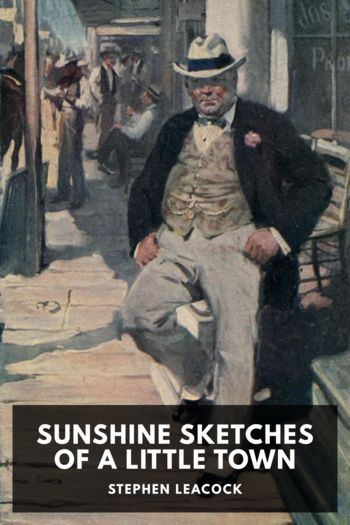Sunshine Sketches of a Little Town, Stephen Leacock [people reading books .TXT] 📗

- Author: Stephen Leacock
Book online «Sunshine Sketches of a Little Town, Stephen Leacock [people reading books .TXT] 📗». Author Stephen Leacock
As I say, it was when Jeff made money that they saw how gifted he was, and when he lost it—but still, there’s no need to go into that. I believe it’s something the same in other places too.
The barber shop, you will remember, stands across the street from Smith’s Hotel, and stares at it face to face.
It is one of those wooden structures—I don’t know whether you know them—with a false front that sticks up above its real height and gives it an air at once rectangular and imposing. It is a form of architecture much used in Mariposa and understood to be in keeping with the pretentious and artificial character of modern business. There is a red, white and blue post in front of the shop and the shop itself has a large square window out of proportion to its little flat face.
Painted on the panes of the window is the remains of a legend that once spelt Barber Shop, executed with the flourishes that prevailed in the golden age of sign painting in Mariposa. Through the window you can see the geraniums in the window shelf and behind them Jeff Thorpe with his little black scull cap on and his spectacles drooped upon his nose as he bends forward in the absorption of shaving.
As you open the door, it sets in violent agitation a coiled spring up above and a bell that almost rings. Inside, there are two shaving chairs of the heavier, or electrocution pattern, with mirrors in front of them and pigeon holes with individual shaving mugs. There must be ever so many of them, fifteen or sixteen. It is the current supposition of each of Jeff’s customers that everyone else but himself uses a separate mug. One corner of the shop is partitioned off and bears the sign: Hot and Cold Baths, 50 cents. There has been no bath inside the partition for twenty years—only old newspapers and a mop. Still, it lends distinction somehow, just as do the faded cardboard signs that hang against the mirror with the legends: Turkish Shampoo, 75 cents, and Roman Massage, $1.00.
They said commonly in Mariposa that Jeff made money out of the barber shop. He may have, and it may have been that that turned his mind to investment. But it’s hard to see how he could. A shave cost five cents, and a haircut fifteen (or the two, if you liked, for a quarter), and at that it is hard to see how he could make money, even when he had both chairs going and shaved first in one and then in the other.
You see, in Mariposa, shaving isn’t the hurried, perfunctory thing that it is in the city. A shave is looked upon as a form of physical pleasure and lasts anywhere from twenty-five minutes to three-quarters of an hour.
In the morning hours, perhaps, there was a semblance of haste about it, but in the long quiet of the afternoon, as Jeff leaned forward towards the customer, and talked to him in a soft confidential monotone, like a portrait painter, the razor would go slower and slower, and pause and stop, move and pause again, till the shave died away into the mere drowse of conversation.
At such hours, the Mariposa barber shop would become a very Palace of Slumber, and as you waited your turn in one of the wooden armchairs beside the wall, what with the quiet of the hour, and the low drone of Jeff’s conversation, the buzzing of the flies against the window pane and the measured tick of the clock above the mirror, your head sank dreaming on your breast, and the Mariposa Newspacket rustled unheeded on the floor. It makes one drowsy just to think of it!
The conversation, of course, was the real charm of the place. You see, Jefferson’s forte, or specialty, was information. He could tell you more things within the compass of a half-hour’s shave than you get in days of laborious research in an encyclopaedia. Where he got it all, I don’t know, but I am inclined to think it came more or less out of the newspapers.
In the city, people never read the newspapers, not really, only little bits and scraps of them. But in Mariposa it’s different. There they read the whole thing from cover to cover, and they build up on it, in the course of years, a range of acquirement that would put a college president to the blush. Anybody who has ever heard Henry Mullins and Peter Glover talk about the future of China will know just what I mean.
And, of course, the peculiarity of Jeff’s conversation was that he could suit it to his man every time. He had a kind of divination about it. There was a certain kind of man that Jeff would size up sideways as he stropped the razor, and in whose ear he would whisper: “I see where Saint Louis has took four straight games off Chicago,”—and so hold him fascinated to the end.
In the same way he would say to Mr. Smith: “I see where it says that this ‘Flying Squirl’ run a dead heat for the King’s Plate.”
To a humble intellect like mine he would explain in full the relations of the Keesar to the German Rich Dog.
But first and foremost, Jeff’s specialty in the way of conversation was finance and the money market, the huge fortunes that a man with the right kind of head could make.
I’ve known Jefferson to pause in his shaving with the razor suspended in the air as long as five minutes while he





Comments (0)